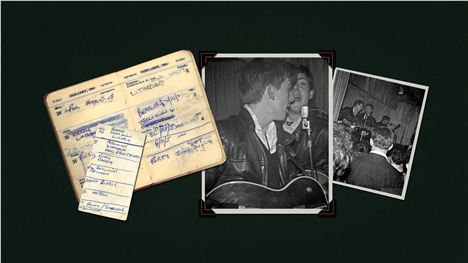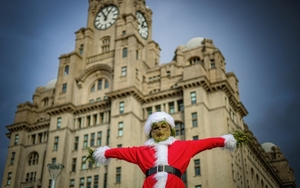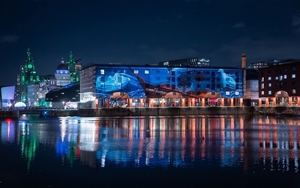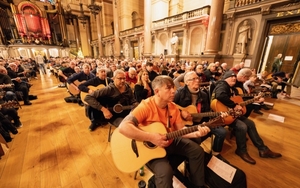A FEW days after Eric’s closed in March 1980, I crossed the waste ground where Cavern Walks now stands (I preferred it then, a nifty shortcut from the bus stop in Lord Street, to Mathew Street).
The protests and marches had petered out and all that remained was a shuttered door to the club now plastered with esoteric graffiti. One piece proclaimed “Long Live the Spirit” another something like “Bernie says goodbye”. This was no doubt local legend Bernie Connor.
There is no sign of musical perspective.
It’s as if an alien ship had landed and dumped prospective rockers in a heap on Mathew Street before whizzing off back into hyperspace
The idea behind this feature, from Liverpool-based Brightmoon Films and given its world premiere at Liverpool's Philharmonic Hall last night, is to capture how that spirit motivated the music that came out of Liverpool from the post war years to the present day and to attempt to dispel the notion that it all begins and ends with The Beatles. Whether or not The City That Rocked The World succeeds in doing this is open to question.
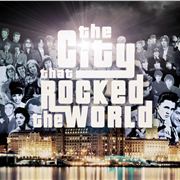
The story starts with the immediate years before the advent of The Beatles, charting the rise of jazz and the skiffle movement that lead to rock ‘n’ roll, but it is not too long before the foursome rear their mop-topped heads.
Here we encounter a problem; there is no sign of musical perspective. It’s as if an alien ship had landed and dumped prospective rockers in a heap on Mathew Street before whizzing off back into hyperspace. What was happening musically in the city before then? How did it influence what followed?
What about the thriving music clubs in Toxteth? The Somali Club in Parliament Street? The Pink Flamingo in Princes Road? This would provide a cornucopia of historical perspective.
The area had the highest concentration of clubs in Liverpool. Stanley House, at the junction of Park Way and Upper Parliament Street, was where The Chants made their first public appearance, at a children’s Christmas party. Later on, it was The Farm’s Carl Hunter who pointed out the contribution of The Real Thing.
The Merseybeat section of The City That Rocked The World at least lays to waste any notion, still being held, that The Beatles were the only show in town, they were just the tip of the iceberg.
It was heartening to see Billy Fury get some credit. From a personal point of view I would like to have seen more of the wonderful Beryl Marsden, who receives but a cursory acknowledgement.
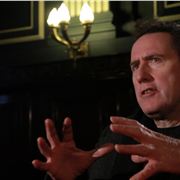 Andy McCluskeyI couldn’t shake off the impression that the stories here had been related an endless number of times. But there were still a few choice anecdotes, such as Faron of Faron’s Flamingos believing that you could just plug an electric guitar into a wall socket!
Andy McCluskeyI couldn’t shake off the impression that the stories here had been related an endless number of times. But there were still a few choice anecdotes, such as Faron of Faron’s Flamingos believing that you could just plug an electric guitar into a wall socket!
Unlike the time allotted to it here, the Merseybeat era came to an abrupt end. The conspiracy theory narrative was that the London-based musical mafia decided that enough was enough and blocked the signing of Liverpool bands in favour of The Dave Clark Five and their ilk.
At last, Deaf School’s Enrico Cadillac Jnr suddenly appears - to point out that he only link between their art school shenanigans and what preceded them was bass player Steve Lindsay’s ‘ironic’ Beatles suit.
To describe Eric’s as a punk club can be misleading, what happened during the second Mathew Street apocalypse was inspired by punk rather than defined by it.
This is by far the most vibrant part of the film. Roger Eagle is rightly depicted as a visionary, despite Ian McCulloch saying to be confronted by him was like meeting ‘A friendly Stalin’!
Will Sergeant points out that there was not a Liverpool ‘scene’: “We were all in bands, but we all hated each other!”
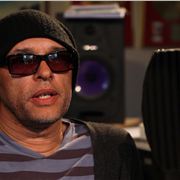 Garry ChristianApart from Cream and the dance years, the rest of our musical tale is given short shrift. The modern era is dealt with in groups of three vaguely related bands.
Garry ChristianApart from Cream and the dance years, the rest of our musical tale is given short shrift. The modern era is dealt with in groups of three vaguely related bands.
My main contention is that the story is told almost exclusively by musicians and others directly involved with the business.
What it needed was the music devotees’ point of view; many of whom will have witnessed each part of the story.
What it needed was people like Bernie Connor: “How many people does it take to change a light bulb at Eric’s? One to change the bulb, 20 on the guest list.
An opportunity wasted.
6/10









